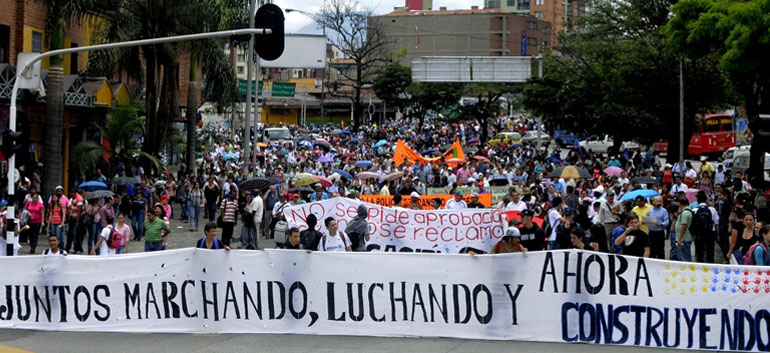A round of nationwide demonstrations Tuesday was only the start of what labor leaders in the health sector have called a “massive organizing effort” to protest the healthcare reform bill under consideration by the Colombian House of Representatives.
Early reports indicated that more than 10,000 health workers in Bogota participated in a series of demonstrations outside of the city’s hospitals on Tuesday. But organizers now claim that at least 200,000 workers throughout the country took part in the national day of protest.
MORE: Health sector workers take to streets as Santos calls for quick passage of reform bill
“In the thirty years I have worked in healthcare, I have never seen the workers so organized, so unified around a cause,” said Yesid Camacho, former President of the National Association of Hospital Workers (ANTHOC), in an interview with Colombia Reports.
He explained that the urgency of current mobilization efforts stems from the belief that workers “are fighting for the future of healthcare in Colombia, fighting for the basic human right to quality treatment and affordable care.”
The current bill being passed through Colombian Congress, he said, “represents the last, unacceptable step in a process that has been destroying the institution of healthcare in this country for 20 years now.”
Law 100
The statutory health law Camacho referred to — Law 100, originally passed in 1993 — has been blamed by experts, industry workers and political critics alike for the troubled state of Colombia’s health system, which faces rising medication and treatment costs, widespread bureaucratic barriers for treatment, corruption that has seen billions of dollars embezzled, and the financial insolubility of the country’s hospitals.
MORE: Colombia health reform: The big issues
If passed by the House of Representatives, the reform bill would join a broader measure currently being evaluated by the Colombian Constitutional Court.
The administration of President Juan Manuel Santos originally proposed the legislation. Critics say that it will, at best, gloss over the most important issues underlying the healthcare crisis and, at worst, aggravate the existing problems.
Doctor Carolina Corcho is one of the many vocal opponents of the reform bill who believe the latter. In an interview with Colombia Reports, the National Spokeswoman and former President of the National Association of Interns and Residents (ANIR) said that the current reform bill “deepens the health model created by Law 100,” which started two decades of privatization in the health sector.
According to Corcho and declarations released on the organization’s website, ANIR is entering into a “permanent assembly” starting Thursday, with the intention of “realizing multiple social activities to bring the Colombian people together in the rejection of the reform law.”
ANIR will partner with labor unions and various social and political organizations, including Colombia’s Tomato Party, in an aggressive schedule of public debates and demonstrations planned for the coming weeks.
“Funeral Torch March”
The first event, a “funeral torch march” through the streets of Bogota and other national urban centers, is planned for Friday night, with “cacerolazo” noise protests and other similar demonstrations scheduled for next week. Protesters, said Corcho, “will dress themselves all in black and carry torches” in a symbolic “entombing” of the proposed health reform.
Camacho said that the ANTHOC, which is also participating in Friday’s “funeral,” also has its own schedule of activities, which could include a nationwide strike before the end of November.
ANTHOC went on partial strike starting this summer, which ended last month when President Santos agreed to cut what Camacho called “a troublesome” series of labor clauses from the proposed legislation.
Whether the ANTHOC strikes again, he said, “will depend on how things develop in Congress and with the government,” adding that additional funds need to be provided for Colombia’s failing hospitals immediately, regardless of what happens with the reform bill.
“The last time we went on strike, we were concerned about maintaining services to the community, which is why our demonstrations did not feature many workers, or draw much attention. This time, we will take to the streets and highways. This time, we will walk out in mass. Because in less than a month, many of Colombia’s hospitals will be shutdown anyway. Services are already being cut. If we strike, it will be because we have to, because the alternative is not viable.”
Sources
- Interview with Yesid Camacho
- Interview with Dr. Carolina Corcho


